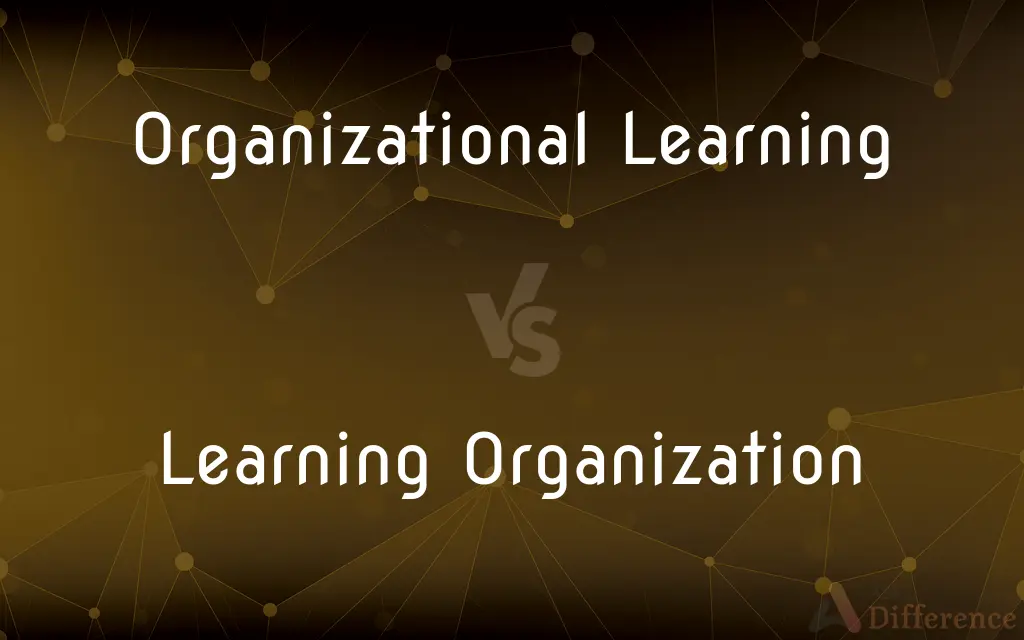Organizational Learning vs. Learning Organization — What's the Difference?
By Tayyaba Rehman & Maham Liaqat — Published on November 25, 2024
Organizational Learning focuses on the process of creating, retaining, and transferring knowledge within an organization, whereas a Learning Organization is a company that facilitates the learning of its members and continuously transforms itself.

Difference Between Organizational Learning and Learning Organization
Table of Contents
ADVERTISEMENT
Key Differences
Organizational Learning emphasizes the mechanisms and processes through which organizations adapt to changes and improve over time. It involves the systematic gathering, analysis, and dissemination of information to enhance decision-making and performance. On the other hand, a Learning Organization embodies a culture that nurtures learning at all levels, encouraging individuals to learn from their experiences and share knowledge freely.
Organizational Learning often occurs through formal structures and strategies, including training programs, knowledge management systems, and policies designed to foster knowledge sharing. In contrast, a Learning Organization cultivates an environment where learning is embedded in the very fabric of the organization's culture, often manifesting through collaborative practices, open dialogue, and a shared vision for the future.
A key aspect of Organizational Learning is its focus on improving existing processes and adapting to external changes through incremental knowledge gains. This might involve refining current practices or addressing specific challenges. Conversely, a Learning Organization aims at continuous transformation, pursuing innovation and strategic change that can lead to a fundamental shift in how the organization operates.
Organizational Learning can be driven by specific objectives or challenges that require targeted learning interventions. This approach ensures that learning is directly relevant to the organization's needs. Meanwhile, a Learning Organization encourages ongoing learning that might not be tied to immediate goals but fosters long-term adaptability and growth.
The impact of Organizational Learning is often measured through improvements in performance metrics or efficiency gains. It tends to be more quantifiable and closely tied to organizational goals. A Learning Organization, however, evaluates success through its ability to cultivate a supportive learning environment, enhance collective knowledge, and remain adaptable in the face of change, which are often qualitative and long-term in nature.
ADVERTISEMENT
Comparison Chart
Definition
The process through which organizations develop, enhance, and manage knowledge.
An entity that promotes individual and collective learning to continuously transform itself.
Focus
Enhancing processes, adapting to change, and solving problems.
Cultivating a culture of continuous learning and innovation.
Mechanisms
Training programs, knowledge management systems, formal policies.
Collaborative practices, open dialogue, shared vision.
Outcome
Improvements in specific practices, efficiency, and decision-making.
Overall adaptability, innovation, and transformative change.
Evaluation
Quantifiable performance improvements and efficiency gains.
Qualitative measures of learning culture strength and adaptability.
Compare with Definitions
Organizational Learning
Systematic efforts to improve skills and knowledge among employees.
The annual workshop series is part of our commitment to organizational learning.
Learning Organization
An entity where learning is integrated into the culture.
Our learning organization thrives because every team member feels empowered to share insights.
Organizational Learning
Enhancing decision-making and problem-solving through shared knowledge.
Through organizational learning, we streamlined our operations, reducing waste.
Learning Organization
Facilitates personal and collective growth to adapt and innovate.
In our learning organization, brainstorming sessions are a regular occurrence for innovation.
Organizational Learning
Capturing and utilizing knowledge to achieve strategic objectives.
Leveraging organizational learning, we outpaced competitors by quickly adapting to market changes.
Learning Organization
Values and practices continuous transformation through learning.
The learning organization model has kept us ahead through rapid industry changes.
Organizational Learning
The acquisition of knowledge to improve organizational effectiveness.
Implementing a new CRM system improved our client management through organizational learning.
Learning Organization
A company that prioritizes continuous learning and knowledge sharing.
As a learning organization, we encourage all employees to pursue continuous education.
Organizational Learning
A process to adapt and evolve by learning from past experiences.
Our organizational learning from the product launch failure led to a successful strategy revision.
Learning Organization
Encourages an environment of openness and collaboration for learning.
Our culture as a learning organization fosters unparalleled collaboration across departments.
Common Curiosities
How do organizations implement Organizational Learning?
Through structured programs, policies, and strategies aimed at knowledge management and skill development.
What defines a Learning Organization?
A learning organization is defined by its commitment to continuous learning and adaptation, fostering a culture that supports growth and innovation.
Can any organization become a Learning Organization?
Yes, any organization can become a learning organization with commitment to creating a supportive learning environment.
What are the key characteristics of a Learning Organization?
Key characteristics include a culture of continuous learning, open dialogue, collaboration, and a shared vision for the future.
How does Organizational Learning affect decision-making?
It enhances decision-making by providing a richer knowledge base and diverse perspectives.
What is Organizational Learning?
It's the process by which organizations create, retain, and transfer knowledge to improve efficiency and adapt to the market.
Why is Organizational Learning important?
It helps organizations adapt to changes, improve processes, and remain competitive.
What role do employees play in a Learning Organization?
Employees are central, actively engaging in learning activities, sharing knowledge, and contributing to the organization's evolution.
What makes a Learning Organization successful?
Success stems from fostering an environment where learning is valued, shared, and applied towards collective goals.
What metrics can measure the effectiveness of a Learning Organization?
Effectiveness can be measured through employee engagement levels, innovation rates, and the ability to adapt to market changes.
How does technology impact Organizational Learning?
Technology facilitates Organizational Learning by enabling knowledge sharing, offering learning platforms, and supporting collaboration.
What is the difference between training and Organizational Learning?
Training focuses on specific skills for immediate tasks, while Organizational Learning is broader, aiming at long-term knowledge and adaptability.
Are there challenges to creating a Learning Organization?
Challenges include overcoming resistance to change, ensuring effective communication, and maintaining a supportive learning culture.
How do Learning Organizations handle failure?
They view failure as a learning opportunity, encouraging analysis and sharing of lessons learned to prevent future mistakes.
Can Organizational Learning lead to innovation?
Yes, by fostering an environment that encourages experimentation and learning from failures, organizations can drive innovation.
Share Your Discovery

Previous Comparison
Australian States vs. Australian Territories
Next Comparison
YUM vs. DNFAuthor Spotlight
Written by
Tayyaba RehmanTayyaba Rehman is a distinguished writer, currently serving as a primary contributor to askdifference.com. As a researcher in semantics and etymology, Tayyaba's passion for the complexity of languages and their distinctions has found a perfect home on the platform. Tayyaba delves into the intricacies of language, distinguishing between commonly confused words and phrases, thereby providing clarity for readers worldwide.
Co-written by
Maham Liaqat














































